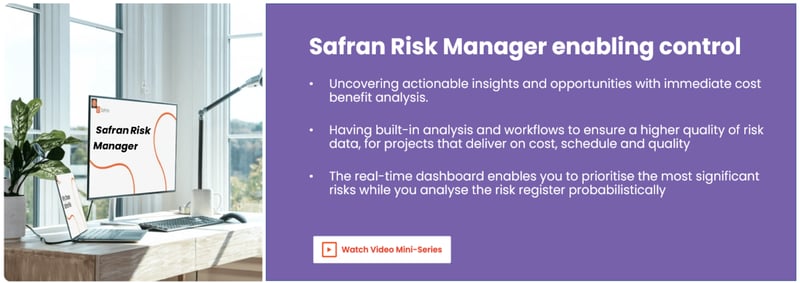How Do We Build Trust In Project Risk Management?
In the fast-paced world of project management, maintaining trust among team members is crucial for successful risk management. Unfortunately, some existing tools and more traditional Excel risk registers often fall short, leading to challenges in trust-building and collaboration. As a head of risk, I have witnessed the negative consequences of data misalignment and the lack of supportive tools for team dynamics and decision-making processes.
In Data We Trust
Excel risk registers and other stand-alone approaches, though widely used, can be difficult to maintain effectively. Changes introduced by team members may go unnoticed or be misunderstood, eroding trust in the data and the individuals involved. This lack of transparency and data consistency undermines effective collaboration and hinders proactive risk management efforts.
Moreover, poor communication further exacerbates the erosion of trust within project teams. When risk data is not effectively shared and communicated, it leads to confusion and misinterpretation. Team members may have differing understandings of risk factors and their potential impacts, resulting in divergent approaches to risk mitigation. This lack of alignment compromises the effectiveness of risk management efforts and erodes trust among team members.
Conversely, adopting standard practices and approaches to risk management can foster trust and break down silos within project teams. When a standardised risk management tool is implemented, team members have a shared framework and language for discussing and addressing risks. This promotes clear and effective communication, enabling team members to understand each other's perspectives and work collaboratively towards mitigating risks.
By addressing the challenges posed by Excel risk registers and improving communication through adopting a robust risk management tool, organisations can establish standard practices and approaches that promote trust-building and break down silos. Improved communication, shared understanding, and collaborative decision-making becomes the foundation for successful risk management, fostering a culture of trust, accountability, and excellence within the organisation.
Empowering Risk Managers: Transforming Collaboration, Visibility, and Reporting
When organisations recognise the need for change, they often use risk management tools to revolutionise collaboration and build team trust. These tools have the potential to transform how teams work together, providing a single, reliable source of truth that ensures data consistency and accuracy. Risk management tools empower risk managers to take on new roles and enhance decision-making processes by simplifying data tracking and facilitating effective review and reporting processes.
The implementation of risk management tools enhances collaboration among project teams. With a shared platform in place, teams can work together seamlessly, promoting clear communication, knowledge sharing, and a unified understanding of risks. This collaborative environment fosters a sense of ownership and shared responsibility, breaking down silos and facilitating cross-functional cooperation. By working collaboratively, teams can proactively identify and address risks, leading to more successful project outcomes.
Moreover, one of the significant benefits of risk management tools is the increased visibility they provide to risk managers. Instead of being burdened with managing the tools themselves, risk managers gain valuable insights into changing data. This newfound visibility allows them to ask pertinent questions about data quality, identify trends and patterns, and improve the risk management process. By leveraging this insight, risk managers can become facilitators and experts, guiding teams in making informed decisions and implementing effective risk mitigation strategies.
Not only do risk management tools empower risk managers, but they also provide immense value to senior decision-makers. These tools enable senior risk managers responsible for portfolio reporting to consolidate risk data from different projects consistently. The ability to review risk management processes and present accurate insights to senior management contributes to informed decision-making and strategic planning. With access to factual, up-to-date information, senior decision-makers can assess the organisation's overall risk exposure and make informed choices to protect and drive the business forward.
Conclusion
In conclusion, building trust and collaboration through advanced risk management practice is essential for project success. The limitations of traditional tools and Excel risk registers can hinder effective risk management, leading to data misalignment and poor communication that erodes trust within project teams. However, organisations can overcome these challenges by adopting standard practices, implementing robust risk management tools, and fostering a culture of trust, accountability, and excellence.
Organisations can build trust through enhanced collaboration, and achieve better project outcomes by recognising the need for change and embracing advanced risk management practices.
Introducing a risk management tool like Safran Risk Manager revolutionises collaboration and data transparency, providing a single, reliable source of truth. With improved communication and shared understanding, teams can work together seamlessly, breaking down silos and promoting cross-functional cooperation. Risk managers play a crucial role in this transformation, becoming facilitators and experts who guide teams in making informed decisions and implementing effective risk mitigation strategies.
What's next?
In the next articles of this series, we will delve further into the cultural transformation that occurs with adopting these practices, showcasing real-life success stories and highlighting the profound impact on organisations and their project delivery.
Stay tuned for more insights on how a shift in risk management approaches can add value and transform the project landscape.
Would you like to learn more about Safran Risk Manager? Click on the link Here.




